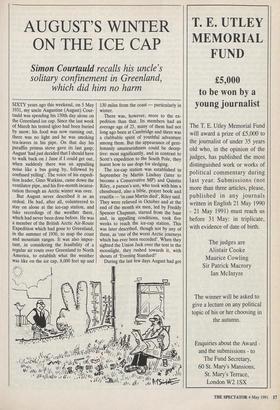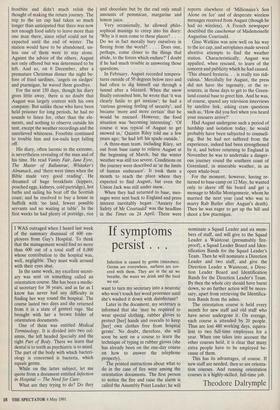AUGUST'S WINTER ON THE ICE CAP
Simon Courtauld recalls his uncle's
solitary confinement in Greenland, which did him no harm
SIXTY years ago this weekend, on 5 May 1931, my uncle Augustine (August) Cour- tauld was spending his 150th day alone on the Greenland ice cap. Since the last week of March his tented igloo had been buried by snow; his food was now running out, there was no light and he was smoking tea-leaves in his pipe. On that day his paraffin primus stove gave its last gasp; August 'had just decided that I should have to walk back on 1 June if I could get out, when suddenly there was an appalling noise like a bus going by, followed by confused yelling'. The voice of his expedi- tion leader, Gino Watkins, came down the ventilator pipe, and his five-month incarce- ration through an Arctic winter was over.
But August never described it as an ordeal. He had, after all, volunteered to stay on alone at the ice-cap station, and take recordings of the weather there, which had never been done before. He was a member of the British Arctic Air-Route Expedition which had gone to Greenland, in the summer of 1930, to map the coast and mountain ranges. It was also impor- tant, in considering the feasibility of a regular air route over Greenland to North America, to establish what the weather was like on the ice cap, 8,000 feet up and 130 miles from the coast — particularly in winter.
There was, however, more to the ex- pedition than that. Its members had an average age of 25, many of them had not long ago been at Cambridge and there was a clubbable spirit of youthful adventure among them. But the appearance of gent- lemanly amateurishness could be decep- tive: most significantly, and in contrast to Scott's expedition to the South Pole, they learnt how to use dogs for sledging.
The ice-cap station was established in September by Martin Lindsay (later to become a Conservative MP) and Quintin Riley, a parson's son, who took with him a chessboard, also a bible, prayer book and crucifix— 'in case Martin died', Riley said. They were relieved in October and at the end of the month six men, led by Freddy Spencer Chapman, started from the base and, in appalling conditions, took five weeks to reach the ice-cap station. This was later described, though not by any of them, as 'one of the worst Arctic journeys which has ever been recorded'. When they sighted the Union Jack over the tent in the moonlight, they rushed towards it, with shouts of 'Evening Standard!'
During the last few days August had got frostbite and didn't much relish the thought of making the return journey. The trip to the ice cap had taken so much longer than anticipated that there was now not enough food safely to leave more than one man there, since relief could not be expected until the end of winter. The station would have to be abandoned, un- less one of them were to stay alone. Against the advice of the others, August not only offered but was determined to be left. And so, on 6 December, after a premature Christmas dinner the night be- fore of fried sardines, 'angels on sledges' and ptarmigan, he waved them goodbye.
For the next 150 days, though his diary gives little away, there is no doubt that August was largely content with his own company. But unlike those who have been held prisoner for long periods, he had no sounds to listen for, other than the ele- ments, and nothing to observe outside his tent, except the weather recordings and the unrelieved whiteness. Frostbite continued to trouble him and toe-nails kept falling off.
His diary, often laconic in the extreme, is nevertheless revealing of the man and of his time. He read Vanity Fair, Jane Eyre, The Master of Ballantrae; Whitaker's Almanack, and 'there were times when the Bible made very good reading'. He dreamed of huge breakfasts (kippers, poached eggs, kidneys, cold partridge), hot baths and sailing his boat off the Scottish coast; and he resolved to buy a house in Suffolk with `no land, fewest possible servants and no waiting at table'. In the first weeks he had plenty of porridge, rice and chocolate but by the end only small amounts of pemmican, margarine and lemon juice.
Very occasionally, he allowed philo- sophical musings to creep into his diary: 'Why is it men come to these places9 Do we in fact morally bury ourselves in fleeing from the world? . . . . Does one, perhaps, come closer to the things that abide, to the forces which endure?' I doubt if he had much trouble in answering those questions.
In February, August recorded tempera- tures outside of 50 degrees below zero and had often to dig himself out through a tunnel after a blizzard. When the snow finally entombed him, he wrote that 'it was clearly futile to get anxious'; he had a 'curious growing feeling of security', and became 'more and more certain' that he would be rescued. However, the food situation was 'becoming interesting'. 'Of course it was typical of August to get snowed in,' Quintin Riley told me a few years ago; 'he had left his spade outside.'
A three-man team, including Riley, set out from base camp to relieve August at the beginning of March, but the winter weather was still too severe. Conditions on the journey were described as 'at the limits of human endurance'. It took them a month to reach the place where they expected to find August, but even the Union Jack was still under snow.
When they had returned to base, mes- sages were sent back to England and press interest inevitably began. 'Anxiety for Safety of Mr Courtauld' was the headline in the Times on 24 April. There were reports elsewhere of 'Millionaire's Son Alone on Ice' and of desperate wireless messages received from August (though he had no wireless). A French newspaper described the cauchemar of Mademoiselle Augustine Courtauld.
Gino Watkins was now well on his way to the ice cap, and aeroplanes made several abortive attempts to find the weather station. Characteristically, August was appalled, when rescued, to learn of the concern and publicity which he had caused. 'This absurd hysteria. . . is really too ridi- culous.' Mercifully for August, the press did not have the ingenuity, or the re- sources, in those days to get to the Green- land coastal base to greet him. And he was, of course, spared any television interviews by satellite link, asking crass questions such as, 'How did you feel when you heard your rescuers arrive?'
Had August undergone such a period of hardship and isolation today, he would probably have been subjected to counsell- ing. But he had not suffered from the experience, indeed had been strengthened by it, and before returning to England in November he was to undertake a danger- ous journey round the southern coast of Greenland, in miserable weather, in an open whale-boat.
For the moment, however, having re- turned to base-camp on 12 May, he wanted only to shave off his beard and get a message to Mollie Montgomerie, whom he married the next year (and who was to marry Rab Butler after August's death). Then he was eager to get up the hill and shoot a few ptarmigan.



















































 Previous page
Previous page